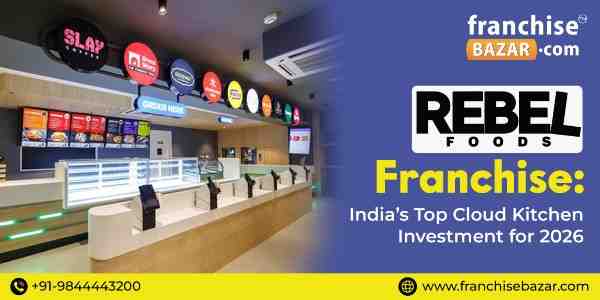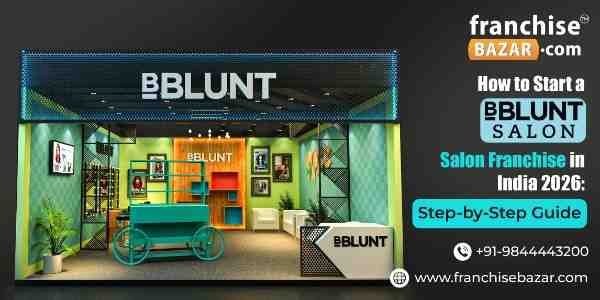Invest in India's Most Viral Franchise Brands-Hot Investment Opportunities

Written By: Resham Daswani
Only a short time ago, products that experienced an Instagram or reel-based virality were considered as passing fads. Nowadays, they're asking for valuations in the crores, and even more crucially, they're getting franchises with multiple units. Influencer marketing, TikTok-style virality, and meme culture aren't only passing fads; they're the driving forces behind the latest wave of viral franchise investments in 2025.
Franchise investors in India are putting a lot of money on "meme brands"—companies that gain overnight fame on social media, turn into scalable franchises, and then crash and burn.
Plus, this isn't merely a food and beverage tale. Branding that centres on memes is changing the game for franchises in every industry, from hair salons to chai tea shops.
The new venture capital is virality in this attention-based capitalist society.
This blog delves into the 2025 trend of viral brand franchises, explaining why it's important, identifying the leaders, and showing how smart investors are making money off of it.
Precisely what is a meme brand?
Simply said, a "meme brand" is a business that gains notoriety through internet parody. The brand takes advantage of internet culture, has success with short-form video material (reels, memes, challenges), and has an easily identifiable identity (typically through eccentric positioning, humorous founder personalities, or culturally relevant content).
Case Studies from India's Streets to Screens
Dolly Chaiwala AKA Dolly Ki Tapri Franchise:
Dolly went from a chai stall in Pune to a pan-India franchise interest thanks to his outrageous attire and distinctive "tandoori chai" pouring technique.
A modest Delhi cafe, Baba Ka Dhaba Franchise, became a national brand overnight thanks to a poignant viral video.
Built on a strong personal brand, a rags-to-riches story, and YouTube virality, MBA Chaiwala has 100+ franchise stores.
At Mokaholic Café, you'll find photo-perfect backdrops made just for Instagram selfies. Launching soon in Tier 2 cities across the country.
Not only do these businesses set the bar high, but they also prove that virality can lead to tangible commercial KPIs like ROI, brand recall, foot traffic, and franchise demand.
Why Investors Are Paying Attention to Viral Brands
Immediate Brand Recognition, No ATL Expenditure
ATL and BTL marketing costs several crores of rupees for traditional franchise brands. Brands that become viral? They rely on user-generated content and algorithmic marketing tools. Those who own franchises receive a portion of the savings.
Following the release of their first viral video, the proprietor of Chai Sutta Bar, whose success was largely the result of organic growth, stated that they had 3,000 franchise enquiries. "No advertising agency exists. Only a single reel."
Magnet for Millennials and Generation Z
Not billboards, but Instagram is where the typical Gen Z consumer first learns about brands. If a company is popular, humorous, or "aesthetic," they want to visit it, post about it on social media, and share it with others. These meme brands make excellent use of the effect that peers have on them.
ROI that is faster and requires fewer expenses
With break-even thresholds as quickly as eight to twelve months, the majority of viral franchise models begin at less than fifteen to twenty-five lakhs. As a result, they are perfect for:
- Investors getting their start
- Young businesspeople and entrepreneurs
- Those franchisees from the region testing the local market
Maximising Franchise Sales through Influencers
By 2025, Instagram direct messages and creator shoutouts have even closed the selling of franchises. Endorsements from well-known figures frequently serve as growth multipliers for these brands. They are even starting franchise clusters in cities or are co-investing with others.
Sectors Perfect for Meme Franchises
By 2025, influencer-backed restaurants and odd cafés are no longer the only places you can find meme companies. Wellness, personal care, clothing retail, and even housekeeping are among the many industries where virality is making inroads. The following is a list of promising industries where franchise demand is skyrocketing thanks to memorable brand names.
Tea Cafe Franchise Chains
Why It Is Effective:
- The Indian market is large enough to accommodate hyper-local flavour profiles, as the country consumes more than 837 thousand tonnes of tea every year.
- Quick return on investment (ROI), low initial cost (₹12-30L), and high daily footfall are the key factors.
- "Chai with a vibe" is more appealing to younger viewers than plain old chai.
Examples of Viral Franchises:
- With the help of motivational clips and the founder's relatability, MBA Chaiwala
- Flamboyantly branded Dolly Ki Tapri - "Swag wali chai"
- The Chai Sutta Bar focusses on visually striking stories that evoke strong emotions.
A New Take on Street Food Dishes
Why It Works:
- There is little structured franchising for Indian street cuisine, despite its worldwide fame.
- In content-first marketing, viral plating and eccentric preparation techniques equal success.
Some Examples of Viral Franchises:
- Bhukha Sher - Flaming tikkis and burgers that have gone viral on TikTok
- Frankie Station - Neon-lit branding on dramatic wrap rolls
- Jugaadi Adda - Street food with an Instagram-worthy twist
Salon, Spa, and Personal Care Startups
The Reason It Works:
- Reels and platforms for short-form video are dominated by content related to beauty.
- Beauty products for men experience double-digit year-on-year growth in India
- Online guides leading to consumer confidence in the brand and subsequent desire for franchises
Case Studies for Viral Franchises:
- Home beauty services through app with clear pricing, yes madam
- The "Transformation in 30 minutes" slogan of Urban Salon is a hit in the malls of Tiers 1 and 2.
- Envi Salons - Elevate your hair care routine with the help of famous faces
Theme Cafés & Instagrammable Dining Spaces
Why Does It Work:
- Traditional formal dining isn't as important to millennials and Gen Z as "shareability."
- People go to these restaurants not just for the food, but also for the atmosphere and decor.
- When there are viral interiors, people spend more time and money on food and drink.
Some Examples of Viral Franchises:
- Mood lighting and mocktails at Mokaholic Café—the perfect backdrop for your Instagram feed!
- The Tandoori Kitchen: A Cooking Experience Like No Other (Open Flames, Slow Roast)
- Quotes from poetry, pastels, and reel-worthy plating—that's Love & Cheesecake!
Quirky FMCG and Hygiene Startups with the Potential for Rapid Growth
How It Works:
- Some direct-to-consumer companies that got their start online are now establishing franchises that include interactive kiosks.
- Sales aren't the only thing at stake here; virality and touchpoint marketing are as well.
Viral Franchise Examples:
- PeeSafe - Everything from taboo cleanliness to prime-time virality
- Bombay Shaving Company is introducing a new line of pilot kiosks called 'Express Shave Bars'.
- Mall pop-ups offering mCaffeine skin test interactive zones
Fitness and Wellness Centres Revamp with a Meme Twist
Why it works:
- A new niche has emerged in the wellness industry since COVID, and that is the meme-fication of wellness.
- Imagine yoga, but with an eye for beauty and wit.
Viral Franchise Instances:
- Famed for their witty reel ads, Flexnest Studios is now offering hybrid fitness franchises.
- Famous people support SARVA Yoga, which has become popular due to its pop-yoga mixes.
Kids' Entertainment and Hobby Areas
What Works:
- Instagram "reels" help parents find their children's favourite play areas.
- The need for unconventional, screen-free educational methods is growing.
Examples of Viral Franchises:
- Tooneytown - "The initially reel-powered kids café in India"
- MiniVerse - Educational amusement park configurations featuring popular how-to videos
What Investors Should Consider While Acquiring A Viral Franchise Brand in India
Do not let the number of followers be your only criterion when assessing meme-brand franchises as an investor. Stick to this checklist:
- Beyond the Buzz, Is There a Real System?:Look over the systems that support the back end, such as the supply chain, the franchisees, and the training modules. Virality poses a risk if not properly implemented.
- Was the brand able to convert buzz into business?: Enquire about:
- numbers of units sold
- Rates of return visitors
- Metrics for converting online to offline
- Are the founders well-versed in media?: Founders frequently serve as the public face of meme brands. Stories told by founders gain the trust of the community and motivate them to be loyal.
- Does the Company Have a Plan for Growth?: Launch helps with virality, but product-market fit is necessary for sustainable scale. Check that the franchise's launch plan is crystal clear on all fronts, including formats, pricing, territories, and marketing assistance.
Risk versus Reward: Is It sustainable?
Virality can strike at any moment. It's true.
Rather than putting their money on a single viral sensation, investors are putting it on businesses that can create viral sensations that people will talk about for a long time. These franchises figure out what works in terms of content, aesthetics, and placement to get people to stop scrolling and actually come, much like startups do.
Tips for Risk Management:
- Reducing the Risk of a Flash in the Pan by Entering Brands After the Second or Third Wave of the Virus
- Pick models with several options (kiosk, café, and delivery)
- Grow your business by branching out into two or three related industries (like fast food and salons).
In conclusion,
Legacy brands and huge capital expenditure models are no longer the only things that attract franchise investors. Searching for something with cultural resonance, digital-first appeal, and the ability to become viral is their goal.
Putting money into meme brands in 2025 is based on attention economics, not chance. It has all the makings of a successful modern franchise if it can attract consumers' attention and turn their likes into sales.
The next great franchise opportunity might not be at a mall, but rather on your Instagram feed right now, provided you have ₹15-₹50 lakhs and an eye for what's popular.
Disclaimer: The brands mentioned in this blog are the recommendations provided by the author. FranchiseBAZAR does not claim to work with these brands / represent them / or are associated with them in any manner. Investors and prospective franchisees are to do their own due diligence before investing in any franchise business at their own risk and discretion. FranchiseBAZAR or its Directors disclaim any liability or risks arising out of any transactions that may take place due to the information provided in this blog.
Recent Blogs

Written By: Harsh Vardhan Singh
Cloud kitchens...

Written By: Bandana Gupta
The luxury salon market...

Written By: Gouri Ghosh
BBLUNT is a powerful...

Written By: Khushboo Verma
India's menswear...
Why Should I Register?
You are seeking to access information which is provided only to registered members. It takes less than a minute to register and access information on FRANCHISEBAZAR.